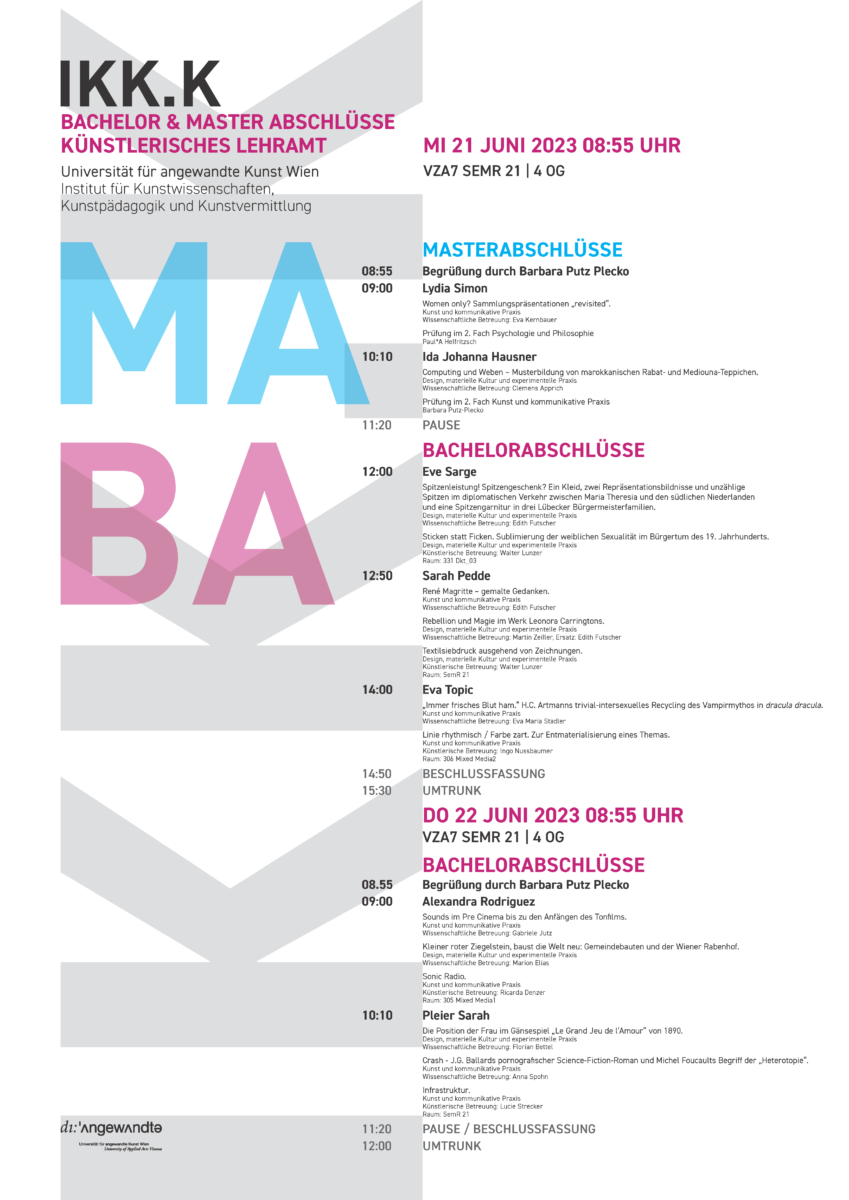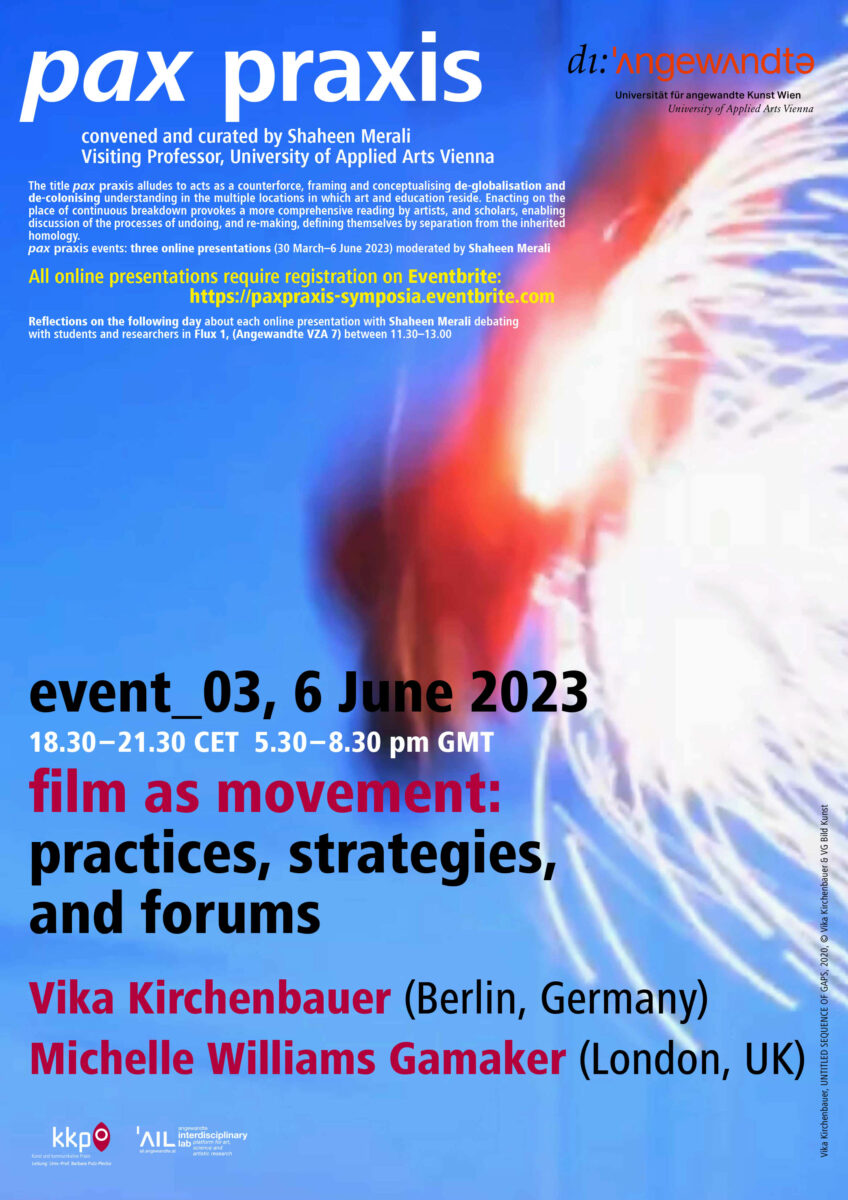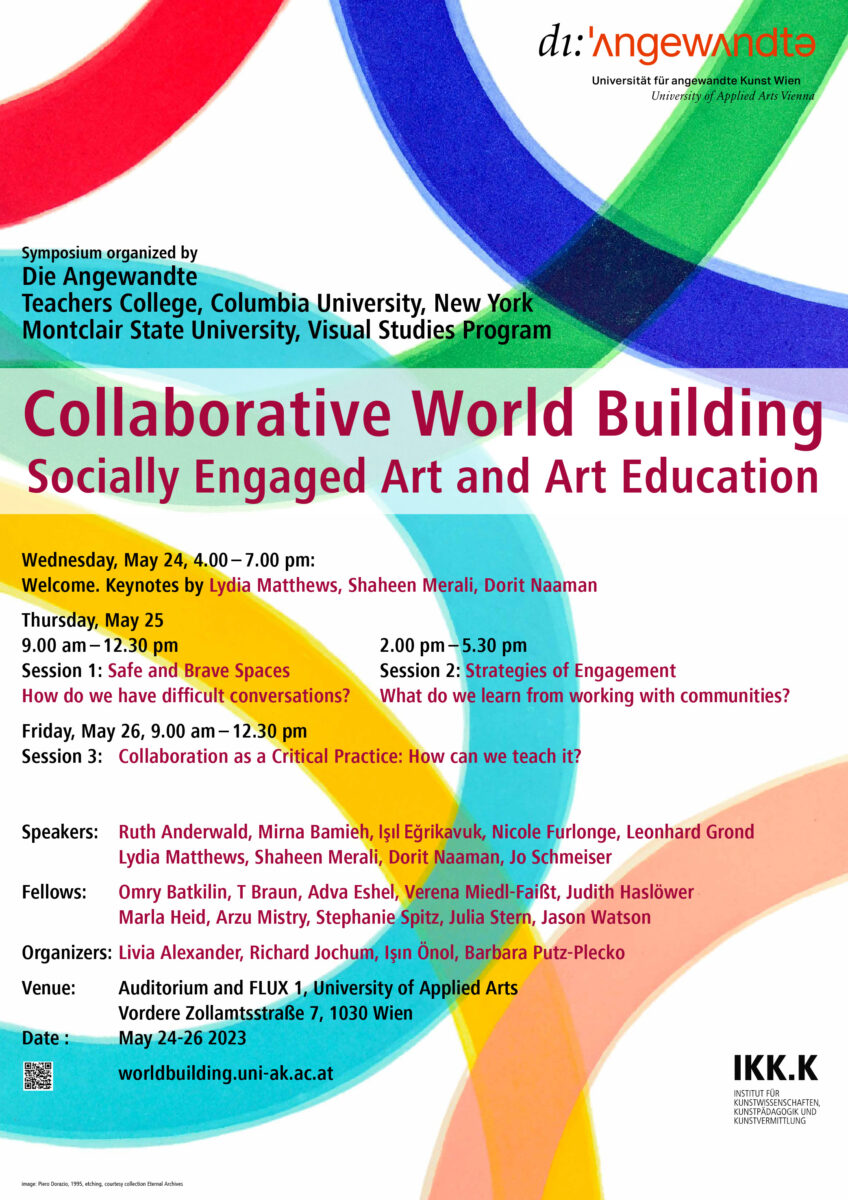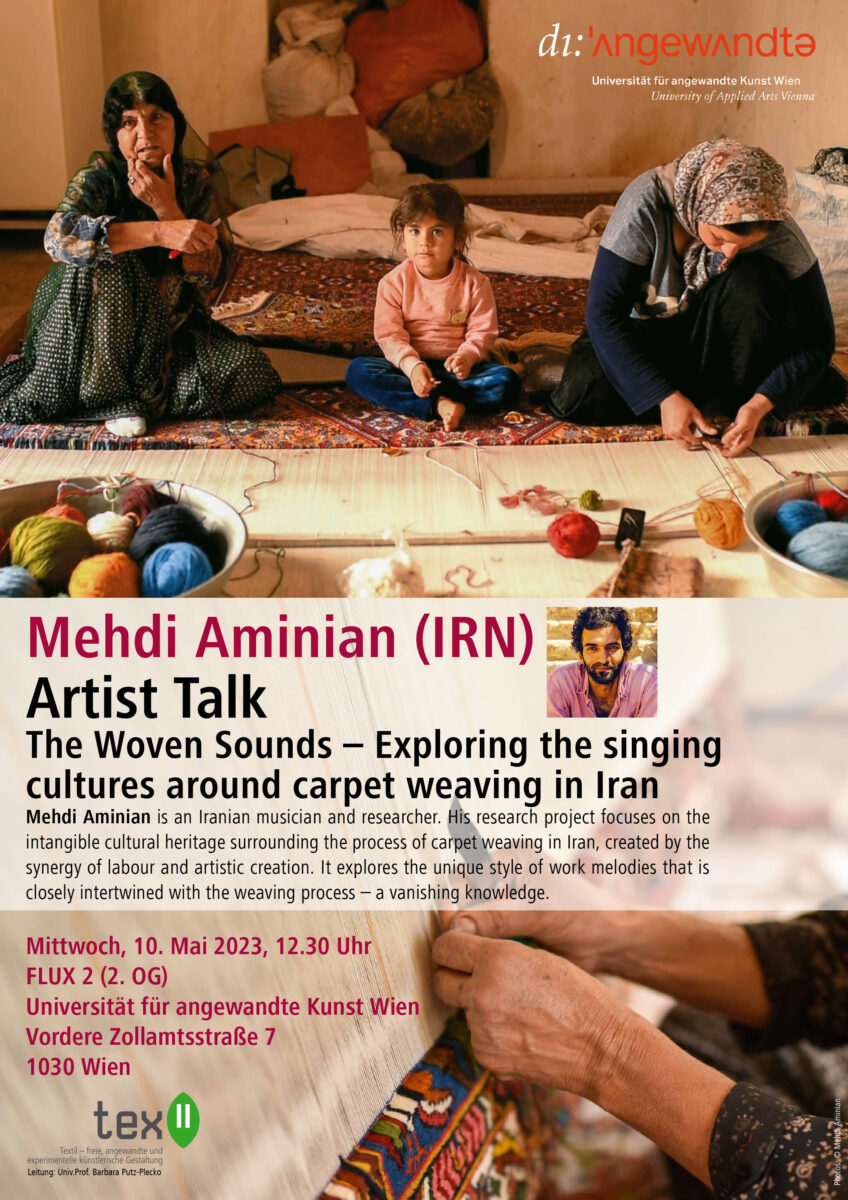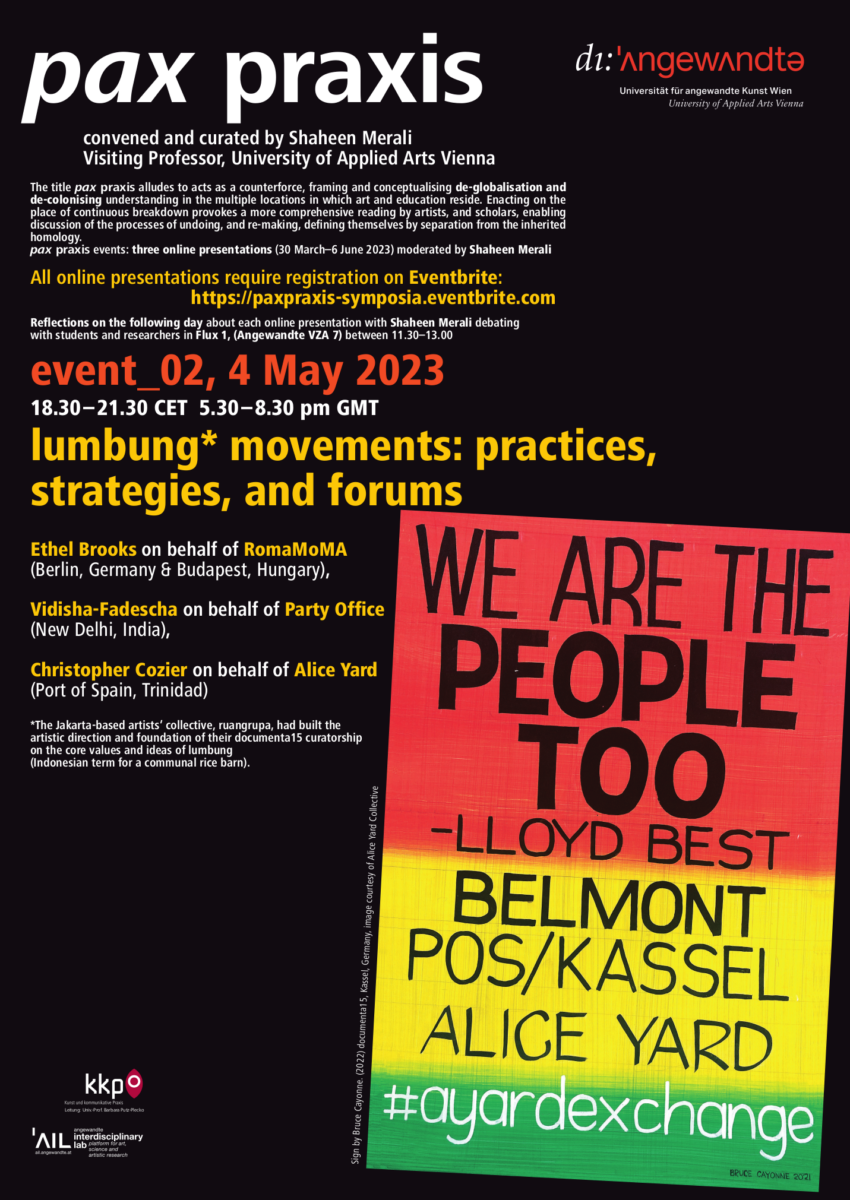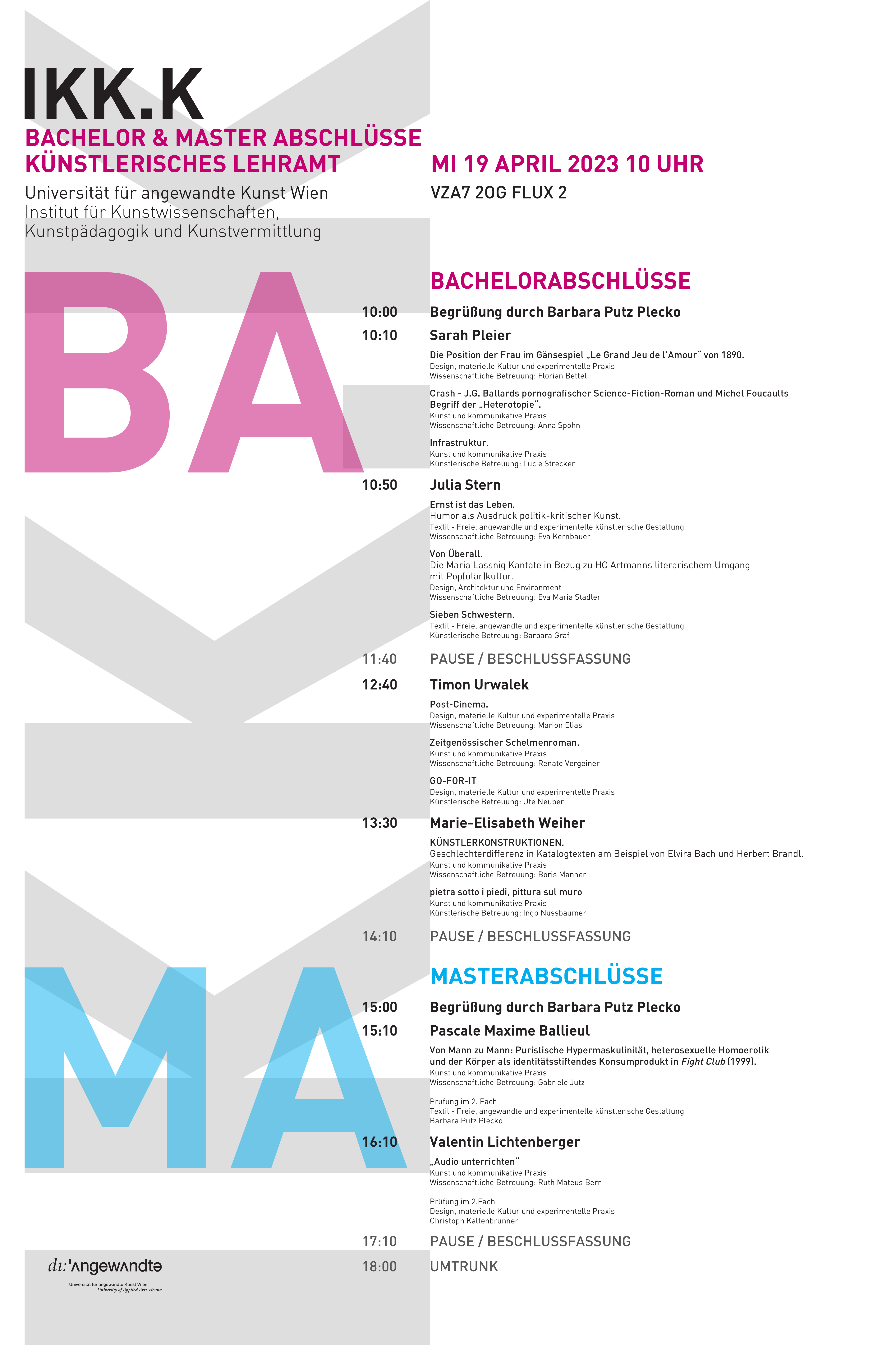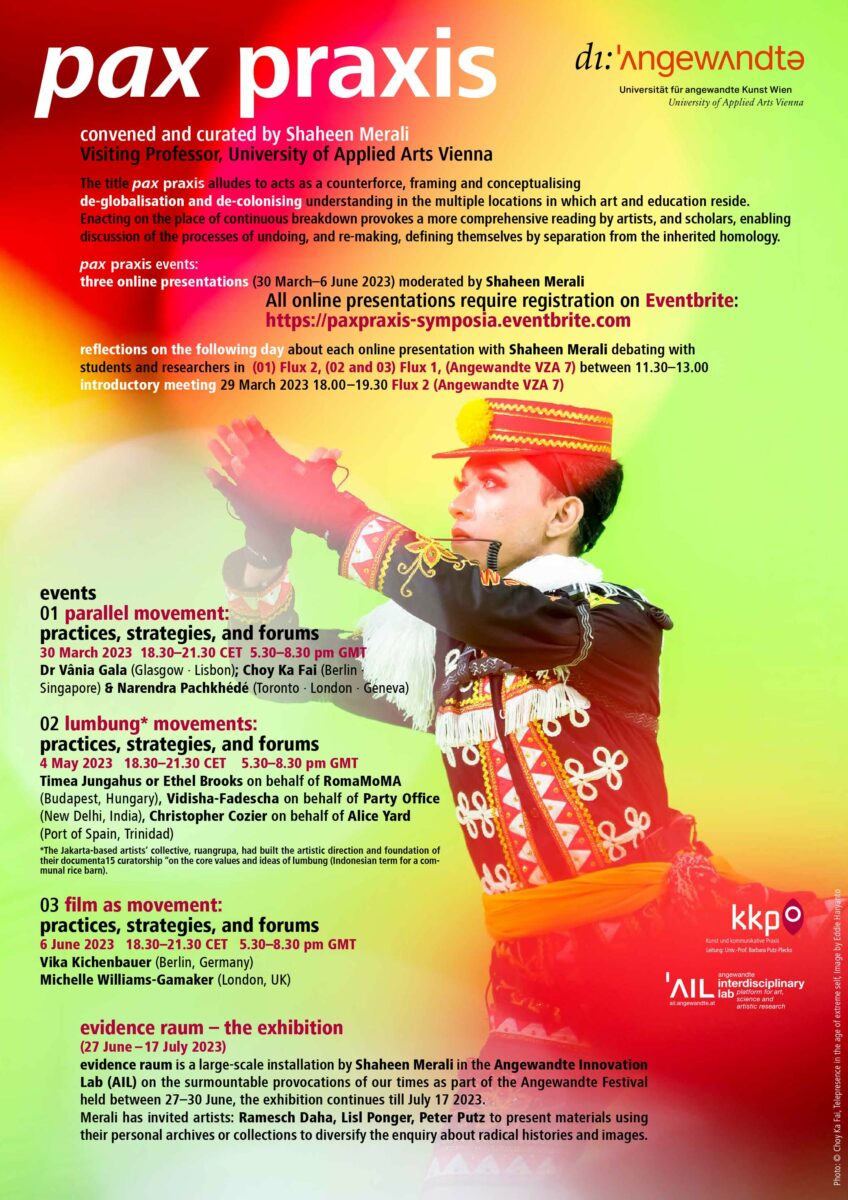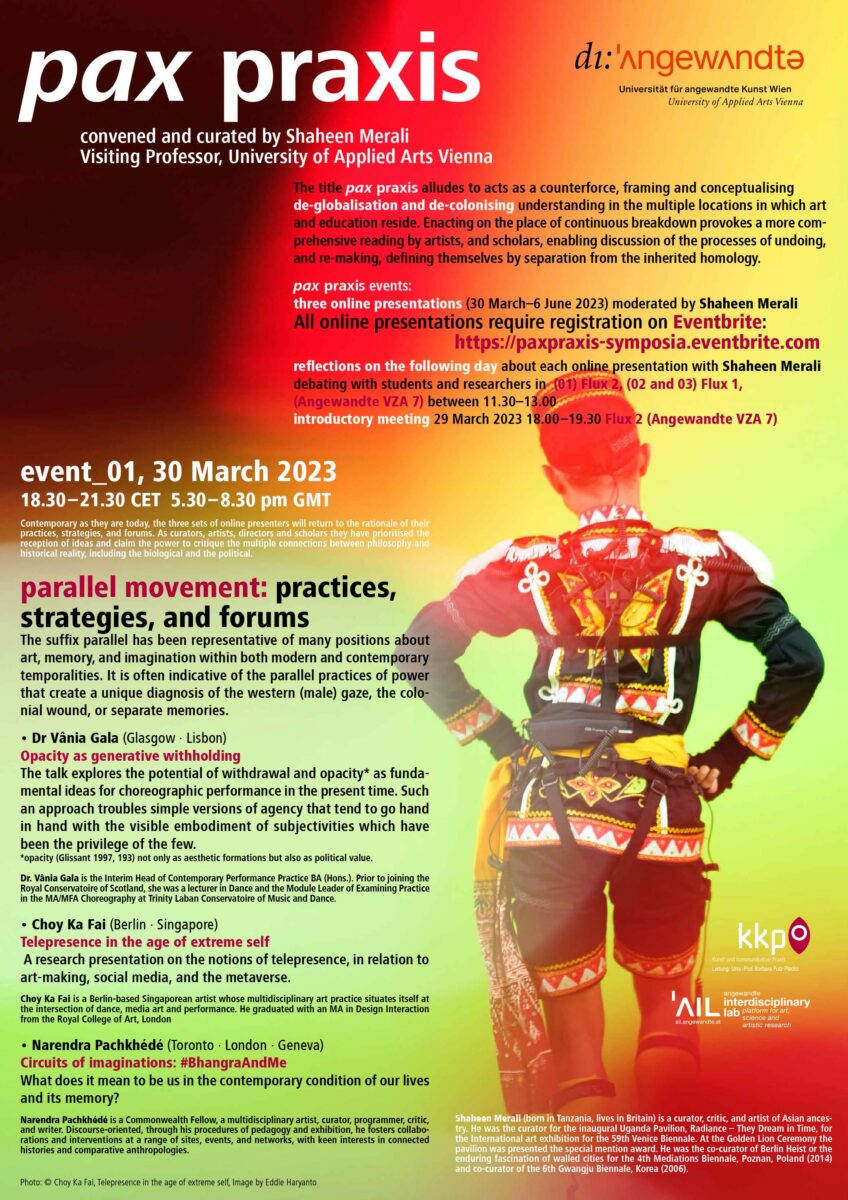

Kunst und kommunikative Praxis
Leitung: Sofia Bempeza und Annette Krauss











Donnerstag, 14.12. 2023, von 10:00 bis 11:30 in den Räumen der Abteilung KKP (Vordere Zollamtsstraße 7, 2. Stock)
Anmeldungen zu diesem Termin bitte per Email an kkp@uni-ak.ac.at
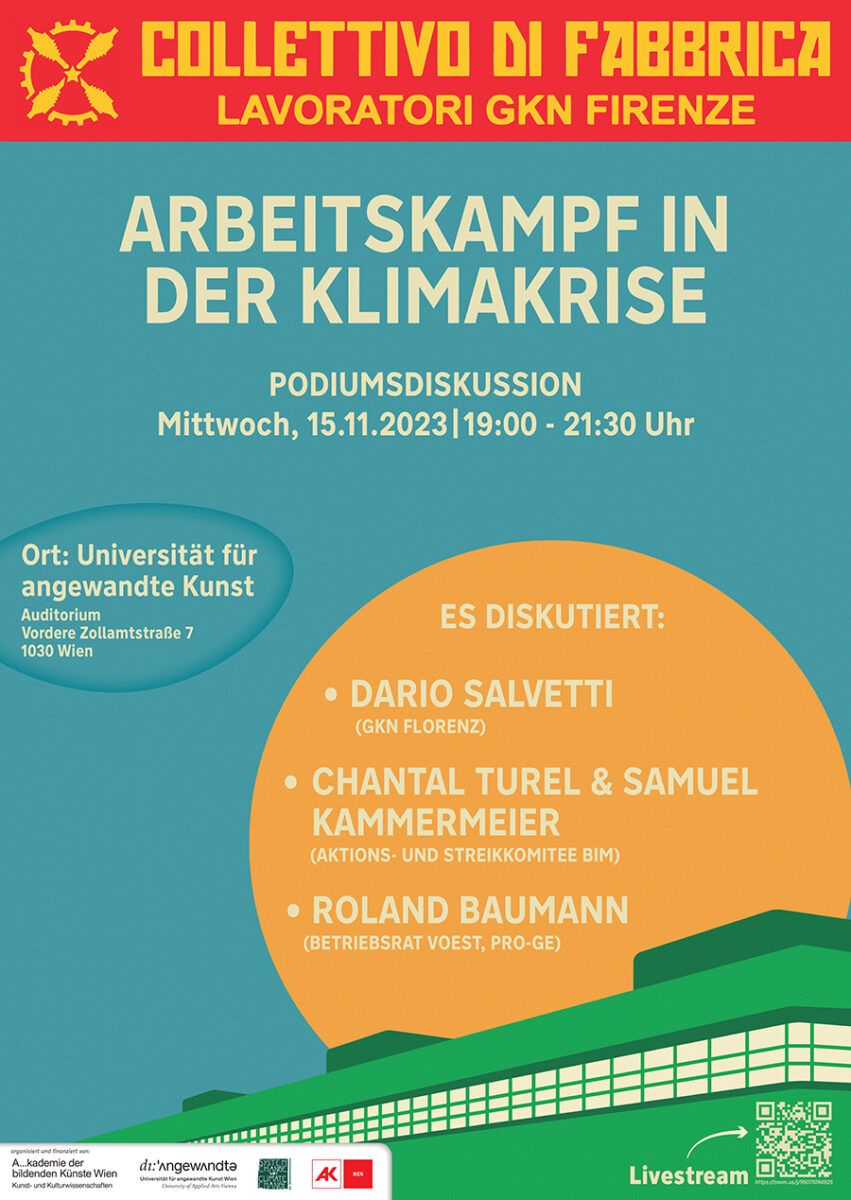
Wann: Mittwoch 15.11.2023 |
Ort: Universität für Angewandte Kunst, Auditorium, Vordere Zollamtstraße 7, 1030 Wien |
Zeit: 19.00 – 21.30 |
Live-Stream: https://zoom.us/j/95071094925 |
Die Veranstaltung ist eine Kooperation von Akademie der bildenden Künste Wien (IKW/ MA Critical Studies), Universität für angewandte Kunst (Kunst und Kommunikative Praxis), System Change not Climate Change und Arbeiterkammer Wien. Sie findet im Rahmen des Seminars Rehearsals for Resistance – On extractivism in art-based research and its socio-eco-political formations zwischen der Universität für angewandte Kunst (Kunst und Kommunikative Praxis), der Kunsthalle Wien, und der Akademie der bildenden Künste Wien (IKW/ MA Critical Studies) statt.
GKN ist zu Gast in Wien! Die ehemalige Autozulieferfabrik GKN in Campi Bisenzio bei Florenz ist europaweit zum Leuchtturmprojekt für einen sozial-ökologischen Umbau von unten geworden. Denn nicht genug, dass die gut 500 Arbeiter:innen sich im Sommer 2021 weigerten, ihre plötzliche Kündigung hinzunehmen und die Fabrik seit über zwei Jahren mit einer andauernden Betriebsversammlung besetzt halten. Sie gingen auch ein breites Bündnis mit Fridays for Future, Wissenschaftler:innen und anderen sozialen Bewegungen ein und entwickelten zusammen einen Plan für den sozial-ökologischen Umbau der Fabrik. Statt Autoteile sollen in Zukunft Lastenräder und Solarpaneele vom Band rollen – vorausgesetzt, die Finanzierung gelingt. Das Shareholder:innen-Modell, das es Arbeiter:innen, lokaler Bevölkerung und globaler Klimabewegung ermöglichen soll, gemeinsame Richtungsentscheidungen zu treffen, wäre ein Labor für demokratische Produktion unter ökologischen Vorzeichen.
In einer Podiumsdiskussion wollen wir uns vom Beispiel GKN inspirieren lassen, aber auch herausfinden, wie es um aktuelle Arbeitskämpfe in Österreich bestellt ist. Mit:
● Dario Salvetti (GKN Florenz)
● Chantal Turel & Samuel Kammermeier (Aktions- und Streikkomitee BiM)
● Roland Baumann (Betriebsrat voest, PRO-GE)
wollen wir Möglichkeiten der Verbindung von Klima- und Arbeitskämpfen und Bündnissen mit Wissenschaft und Kunst aufspüren, Herausforderungen und Widersprüche diskutieren, die Lage der Belegschaften in fossilen Betrieben verstehen und vom Beispiel GKN lernen.
Organisiert und finanziert von: Akademie der bildenden Künste Wien (IKW/ MA Critical Studies) und Universität für angewandte Kunst (Kunst und Kommunikative Praxis), System Change not Climate Change und Arbeiterkammer Wien.
GKN in Vienna:
Connecting climate and workers’ struggles; alliances with sciences and art
When: Wednesday 15.11.2023
Where: University for Applied Arts, Auditorium, Vordere Zollamtstraße 7, 1030 Wien
Time: 19.00 – 21.30
Live-Stream: https://zoom.us/j/95071094925
The event is a cooperation between Academy of Fine Arts (IKW/ MA Critical Studies), University of Applied Arts (Art and Communication Practices), System Change not Climate Change and Arbeiterkammer Wien
GKN is a guest in Vienna! The former automotive supplier factory GKN in Campi Bisenzio near Florence became a European symbol for socio-ecological transformation from below. Not only did the approximately 500 workers refuse to accept their sudden layoff in the summer of 2021 and have been occupying the factory for over two years, by holding a work meeting ever since. They also established a wide alliance with Fridays for Future, scientists and many other social movements, with which they jointly developed a plan for the social-ecological transformation of the factory. Instead of car components, the future plan is the production of cargo bikes and solar panels – as long as the financings are secured. A shareholder model that would enable workers, the local population and the global climate movement to make joint decisions would be a laboratory for democratic production under ecological conditionst.
In a panel discussion we want to learn about the example of GKN, but also find out what the situation is regarding current labour struggles in Austria. Together with Dario Salvetti (works council representatives and worker at GKN), and works council representatives in the fields of social sector and industrial production, we want to seek out possibilities of linking climate and labor struggles, and alliances with science and art, discuss challenges and contradictions, understand the situation of employees in fossil fuel companies and get inspired by the example of GKN.
organized and financed by: Academy of Fine Arts Vienna (IKW/ MA Critical Studies) and University of Applied Arts (Art and Communication Practices), System Change not Climate Change and Chamber of Arbeiterkammer Wien.
The event takes place in the framework of Rehearsals for Resistance
– On extractivism in art-based research and its socio-eco-political formations between the University of Applied Arts Vienna, the Kunsthalle Vienna, and the Academy of Fine Art, Vienna.
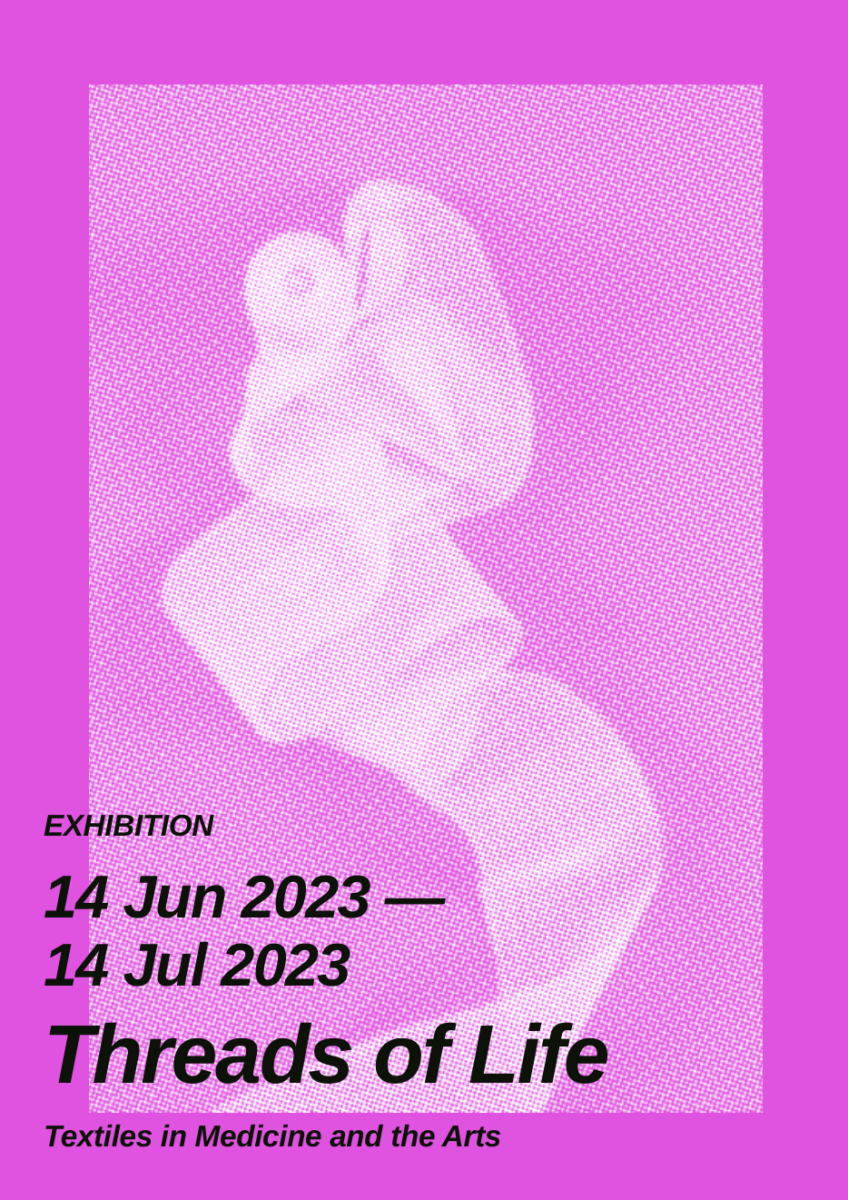
Hello fellow Humans!
In June, we connect the disciplines of medicine and art through the subject of textiles. What is the multifaceted relationship between those three and which dialogue and productive tension can be generated by combining historical and artistic positions?
Join us next week for the opening of Threads of Life. Textiles in Medicine and the Arts.
We strive to curate a vibrant and diverse program, and June is no exception, find all details below, we look forward to seeing you soon!
Opening Hours AIL Exhibition:
Mon, Tue, Wed, Fri: 13:00 – 18:00
Thu: 13:00 – 20:00
Opening Hours Café Exchange:
Mon, Tue, Wed, Fri: 10:00–18:00
Thu: 10:00–20:00
(Lunch from 12:00–15:00)
Unless otherwise stated, all AIL events are free and no registration is required. – Find all details on ail.angewandte.at
Although textiles have been indispensable to medicine since time immemorial, their role in this context has been understudied so far. From the surgical thread, wound dressings, wipes, pads, and protective clothing to the hospital bed, the practices of healing are unimaginable without them. But the relationship between textiles in the arts, wellbeing and health is much broader. It includes, but is not restricted to, the use of such techniques as knitting, crocheting, weaving or braiding in the development of cardiovascular grafts or surgical meshes.
The use of textiles is also ambivalent. They have found use in psychiatric institutions for the bodily restraint of patients, but patients also used them for designing their environment and creating body wrappings as survival strategies. Textiles can also be a source of ill-health: Beyond the addition of harmful substances during their production, textiles have been used in fashion for centuries to shape, deform and discipline the body according to ideals of beauty. Practitioners from the fields visual arts and artistic research reflect on this complicated relationship in manifold ways. Artists use fabrics to evoke the vulnerability of the human body, its ongoing decay and imminent death, and also to highlight the complexity of interhuman relationships.
Artists:
Sonja Bäumel, Pascale Maxime Ballieul, Camille Borchert, Ida Flora Frantal, Raja Goltz, Barbara Graf, Ruth Anderwald + Leonhard Grond, Elizabeth McGlynn, Ute Neuber, Katharina Sabernig, Hannah Schwab, Yuliia Strykovska, Leo Ruben Enosch Zellweger
Curatorial team:
Monika Ankele (Medical University of Vienna), Barbara Graf (University of Applied Arts Vienna), Katrin Pilz (Ludwig Boltzmann Institute for Digital History, Vienna), Monika Pietrzak-Franger (University of Vienna), Barbara Putz-Plecko (University of Applied Arts Vienna), Katharina Sabernig (University of Applied Arts Vienna), Georg Vasold (University of Vienna).
The curatorial team is part of the transdisciplinary working group History of Medicine and Medical/Health Humanities of the Austrian Academy of Sciences (ÖAW).
Program Overview
10:00 Welcome & Introduction
10.40 Keynote I
11:30 – 12:30 Guided Tour through the exhibition
13:30 – 17:00 Conversation I & II
17:30 Keynote II
18:30 Social Gathering
(Detailed Program)
Lecturer and Keynote Speakers:
Lydia Arantes (University of Graz), Monika Ankele (Medical University Vienna), Leonie Braam (University Hospital and Faculty of Medicine Tübingen), Helmut Denk (Project Lead History of Medicine and Medical/Health Humanities), Anamaria Depner (Goethe University Frankfurt), Barbara Graf (University of Applied Arts Vienna), Heidi Helmhold (University of Cologne), Céline Kaiser (HKS – University of applied sciences and arts in Ottersberg), Barbara Putz-Plecko (University of Applied Arts Vienna), Christine Radtke (Medical University Vienna), Monika Pietrzak-Franger (University of Vienna), Katharina Sabernig (University of Applied Arts Vienna), Georg Vasold (University of Vienna)
[This Symposium will be held in German]
